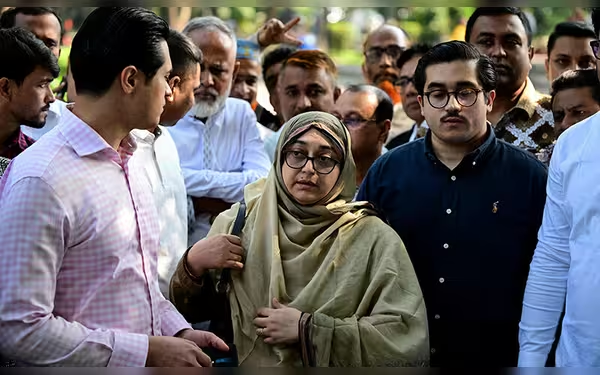Sunday, December 22, 2024 04:03 AM
Bangladesh Court Overturns Tarique Rahman's Grenade Attack Conviction
- Tarique Rahman's conviction for grenade attack overturned.
- Court found original trial lacked proper legal procedures.
- Families of victims continue to seek justice.
 Image Credits: dawn
Image Credits: dawnBangladesh court quashes Tarique Rahman's conviction for the 2004 grenade attack on Sheikh Hasina, raising questions about justice and political manipulation.
In a significant legal development, a top Bangladeshi politician, Tarique Rahman, has had his conviction for a notorious grenade attack on former Prime Minister Sheikh Hasina overturned. This ruling, made by the High Court in Dhaka, marks a pivotal moment in a case that has lingered in the shadows of Bangladesh's political landscape since 2004. The grenade attack, which occurred during a political rally, resulted in the tragic loss of more than two dozen lives and left many others injured.
Tarique Rahman, the son of two-time Prime Minister Khaleda Zia, was convicted in absentia, meaning he was not present in court during the trial. The court found that the original trial did not adhere to proper legal procedures, leading to the quashing of his conviction along with those of 48 others. The Bangladesh Nationalist Party (BNP), which Rahman leads, has consistently denied any involvement in the attack, claiming that the government of Sheikh Hasina has manipulated the judicial process to target political opponents.
During the trial, the state presented 225 witnesses; however, none could confirm seeing any of the accused throw grenades or take part in conspiracy meetings. This lack of direct evidence was highlighted by Rahman's lead defense lawyer, S.M. Shahjahan, who emphasized the flaws in the prosecution's case. The 2004 attack was a direct assault on Hasina's Awami League party, which was in opposition at the time, and it occurred just as she was concluding her speech.
Critics of the original investigation have pointed fingers at Khaleda Zia's government, accusing it of obstructing justice. Shishir Monir, another defense lawyer, stated that subsequent investigations under Hasina's administration coerced suspects into naming Tarique and other BNP leaders as the attackers. He revealed that some accused were detained for extended periods, during which they allegedly faced pressure to confess.
As the political climate in Bangladesh continues to evolve, Tarique Rahman is expected to return from his long exile in London, especially with his mother’s health declining. His return could reshape the political dynamics in Bangladesh, particularly for the BNP, which has been in opposition for years.
Despite the court's ruling, the families of the victims from the grenade attack are still seeking justice. Rafiqul Islam, a key witness, expressed the ongoing pain and need for accountability, stating, "I saw… body parts strewn on the street." His words resonate with the many who believe that justice has yet to be served.
This case serves as a reminder of the complexities of political power and justice in Bangladesh. As the nation grapples with its past, the quest for truth and accountability remains crucial. The recent court ruling may have cleared some names, but it has also reignited discussions about the need for a fair and transparent judicial process that truly serves the victims and their families.













